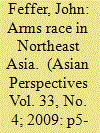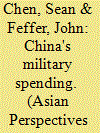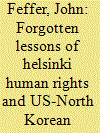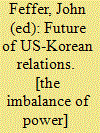| Srl | Item |
| 1 |
ID:
094143


|
|
|
| 2 |
ID:
094145


|
|
|
| 3 |
ID:
057670


|
|
|
| 4 |
ID:
071741


|
|
|
|
|
| Publication |
London, Routledge, 2006.
|
| Description |
xviii, 209p.
|
| Standard Number |
0415770378
|
|
|
|
|
|
|
|
|
|
|
|
Copies: C:1/I:0,R:0,Q:0
Circulation
| Accession# | Call# | Current Location | Status | Policy | Location |
| 051228 | 327.730519509051/FEF 051228 | Main | On Shelf | General | |
|
|
|
|
| 5 |
ID:
160719


|
|
|
|
|
| Summary/Abstract |
Donald Trump's America First philosophy stresses the importance of sovereignty in international relations, bringing US policy at least rhetorically in line with that of North Korea. Rising nationalism in China and Japan has also sharpened an already existing debate on sovereignty in the region involving territorial issues and history questions. The issue has come to a head around North Korea's claim to a sovereign right to a nuclear weapons program. The current status quo, in which North Korea remains an unofficial member of the nuclear club and the international community continues to pressure it into rolling back its nuclear program, could persist. But the change in the underlying philosophy in US policy suggests that this status quo has become increasingly unstable. War could disrupt the status quo, most likely as a result of miscalculation or misinterpretation. There are three potential nonmilitary exits from this status quo. One possible solution would be the normalization of the sovereign status of all the countries in the region. A second scenario involves a modest “smudging” of sovereignty, for example, the “freeze for a freeze” proposal supported by both China and Russia. In the third scenario, the countries of the region address the multilateralism gap by forging cooperation on a common threat—climate change—that reframes sovereignty and initiates a “virtuous circle of engagement.”
|
|
|
|
|
|
|
|
|
|
|
|
|
|
|
|